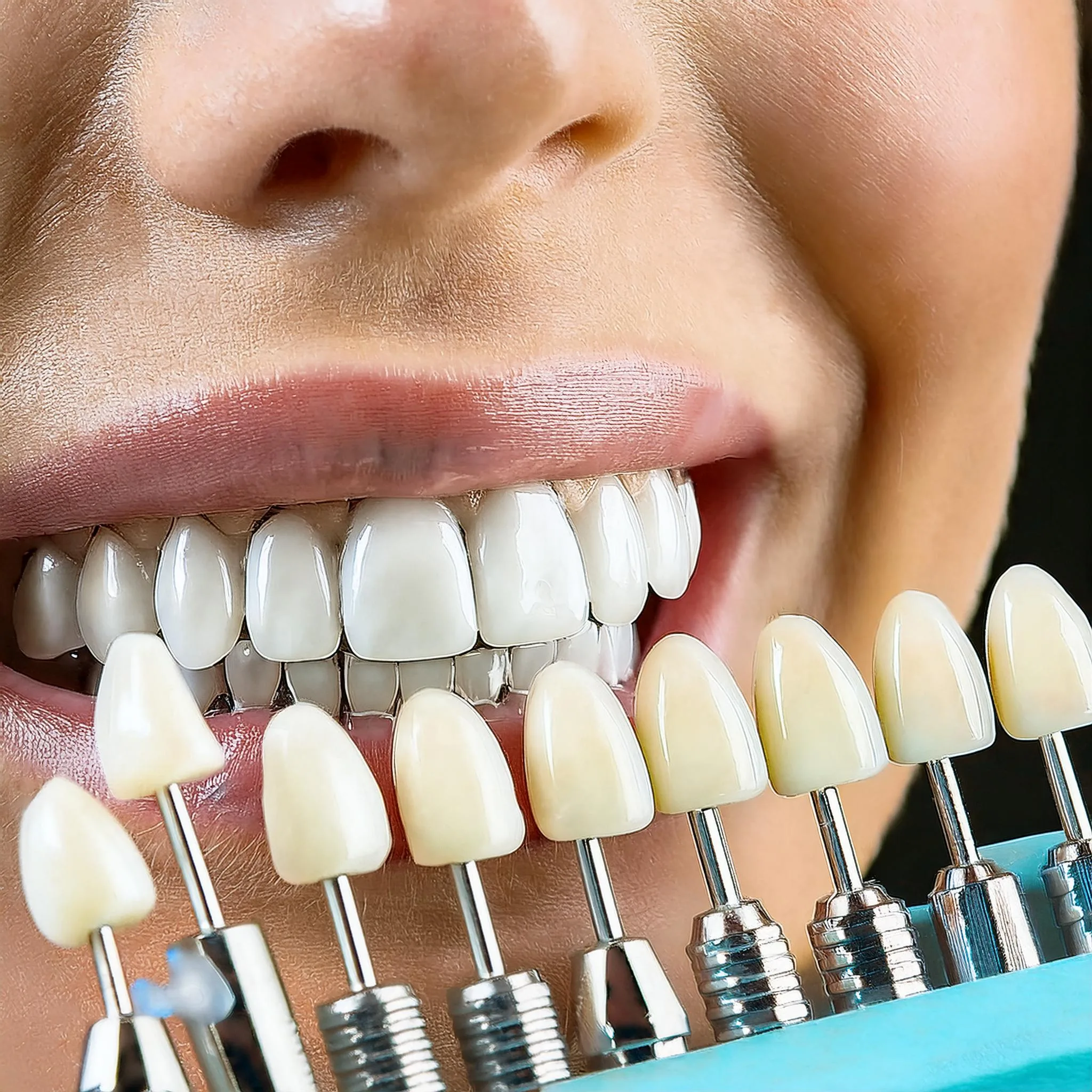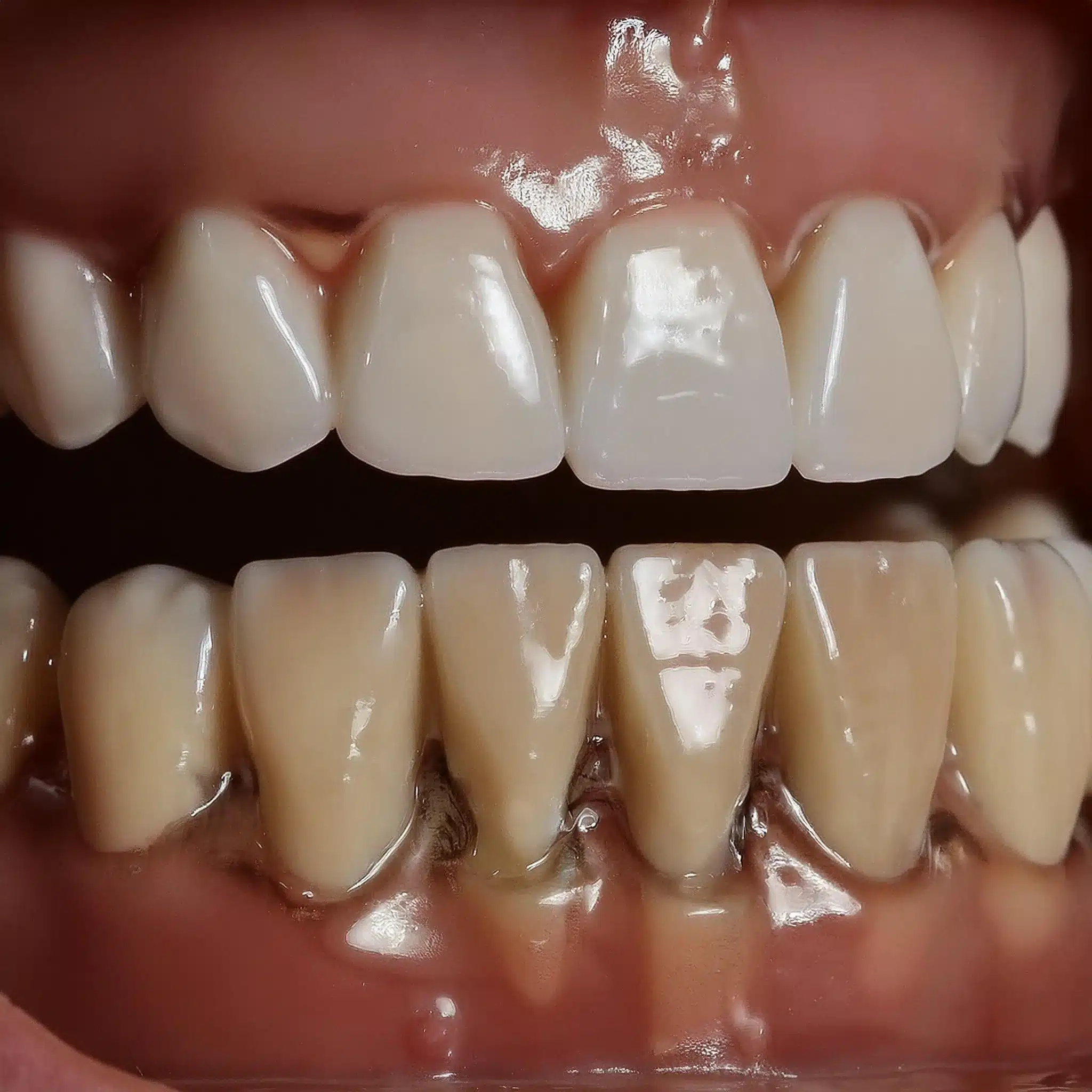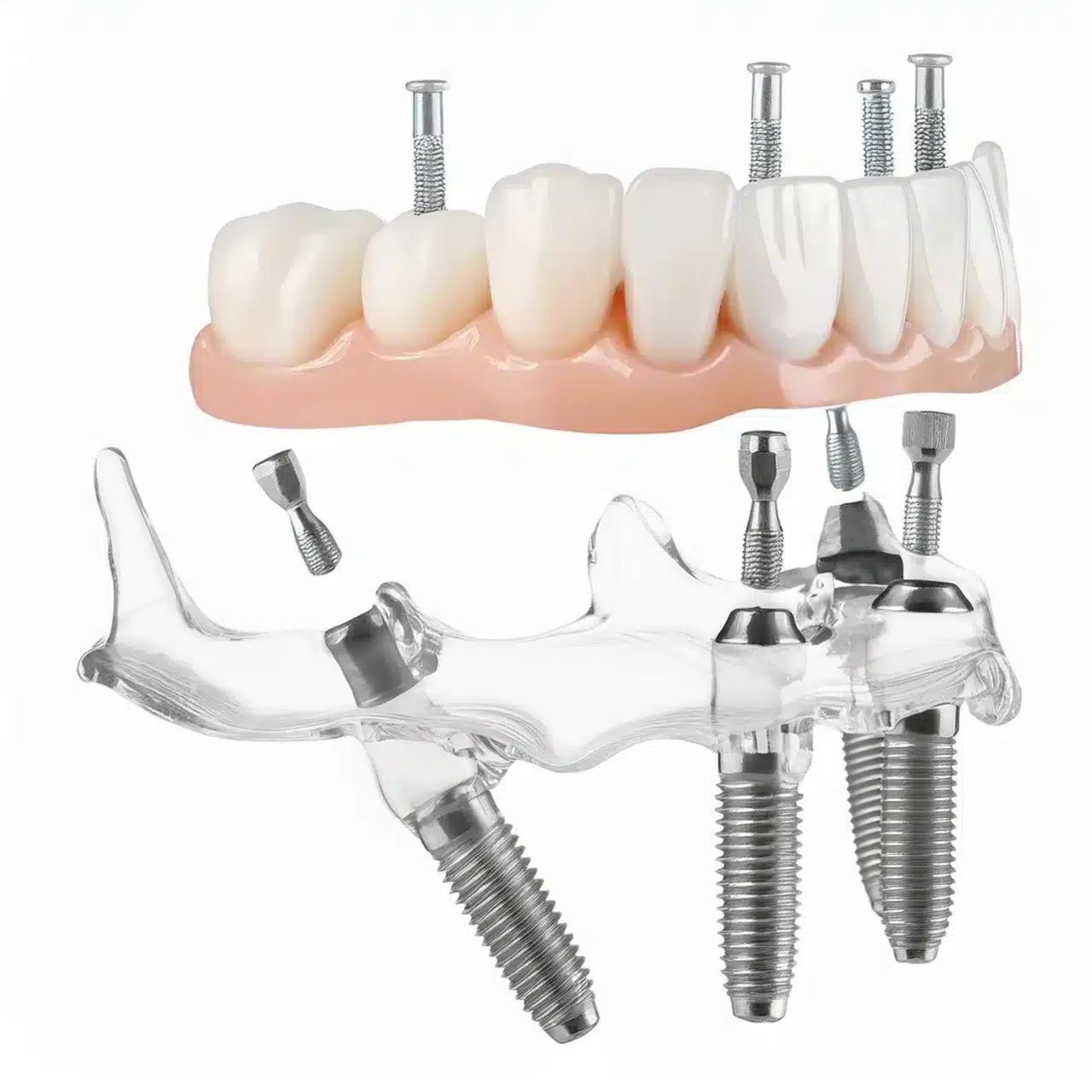Dental implants vs. bridges—which is the best choice for replacing missing teeth?
If you’re struggling with tooth loss, you’re likely wondering which option will provide the most natural look, feel, and functionality while also fitting within your budget.
What is the Main Difference Between Dental Implants and Bridges?
Dental implants and bridges are two common solutions for replacing missing teeth. Dental implants offer longevity and bone preservation but require surgery and are more expensive (€2,450). Dental bridges are less invasive and more budget-friendly (€450-€1,000) but may not prevent jawbone deterioration and have a shorter lifespan (5-10 years).
| Veçori | Implantet Dentare | Dental Bridges |
|---|---|---|
| Jetëgjatësia | Over 20 years(1) | 5-10 years(5) |
| Bone Preservation | Prevents bone loss(2) | May not prevent bone loss(2) |
| Kostoja | €2,450(3) | €450-€1,000(3) |
| Surgical Procedure | Requires surgery(4) | No surgery required(5) |
| Koha e rikuperimit | Longer recovery(4) | Quicker recovery(5) |
Comparing Dental Implants and Bridges
Advantages and Disadvantages of Each Option
Dental implants and bridges each have their own set of benefits and drawbacks, making the choice dependent on individual needs and circumstances.
Advantages of Dental Implants:
Longevity: Dental implants are known for their durability, often lasting over 20 years with proper care, which makes them a long-term solution for tooth replacement that closely resembles natural teeth (1).
Bone Preservation: Implants help maintain jawbone health by mimicking natural tooth roots, which can prevent bone loss over time (2).

Disadvantages of Dental Implants:
Kostoja: The initial investment for dental implants is higher, averaging around €2,450 per implant (3).
Surgical Procedure: Implant placement requires surgery, which can be a deterrent for some patients due to the associated recovery time and potential complications (4).
Advantages of Dental Bridges:
Më pak invazive: Bridges do not require surgery, making them a more straightforward procedure with a quicker recovery time (5).
Me kosto efektive: Bridges are generally more affordable, with costs ranging from €450 to €1,000, depending on the materials used and the complexity of the case (3).

Disadvantages of Dental Bridges:
Shorter Lifespan: Bridges typically last 5 to 10 years, which may lead to additional costs over time as replacements are needed (5).
Impact on Adjacent Teeth: Bridges rely on neighbouring teeth for support, which can lead to wear and potential damage to these teeth over time (2).

Factors to Consider: Oral Health, Budget, and Aesthetics
When deciding between dental implants and bridges, several factors should be considered:
Oral Health: Assess the condition of your jawbone and gums. Implants require sufficient bone density, while bridges may be suitable if bone loss is a concern (1).
Budget: Consider both the initial costs and long-term expenses. While implants have a higher upfront cost, their longevity might offer better value over time (3).
Aesthetics and Lifestyle: Implants provide a more natural appearance and feel, which might be important for those prioritizing aesthetics. Bridges can also be aesthetically pleasing but may not feel as natural (4).
While mini dental implants vs traditional dental implants is another important consideration for those exploring implant options, the primary factors include oral health, where you must assess the condition of your jawbone and gums
| Factor | Implantet Dentare | Dental Bridges |
|---|---|---|
| Oral Health | Requires sufficient bone density(1) | Suitable if bone loss is a concern(1) |
| Budget | Higher upfront cost, better long-term value(3) | More affordable initially(3) |
| Estetike | Natural appearance and feel(4) | Aesthetically pleasing but may not feel as natural(4) |
Dental Implant Alternatives: Exploring Options Beyond Implants
When considering alternatives to dental implants, it’s important to explore options that can effectively address tooth loss while aligning with individual needs and circumstances.
What are Dental Implant Alternatives?
Dental implant alternatives offer different approaches to tooth replacement, catering to those who may not be suitable candidates for implants.
These alternatives can include various types of dental bridges and other non-invasive solutions.
Dental Bridges as a Viable Alternative to Implants
Dental bridges remain a popular choice for those seeking a less invasive and cost-effective solution.
They can provide a natural look and feel, making them a viable alternative for tooth replacement.

Përfundim & Çështje kryesore
Merr kryesore:
Dental implants offer longevity and bone preservation but are more expensive and require surgery.
Dental bridges are less invasive and more budget-friendly but may not prevent jawbone deterioration and have a shorter lifespan.
Consider your oral health, budget, and aesthetics when deciding between dental implants and bridges.
konkluzioni:
Choosing between dental implants and bridges depends on individual needs and circumstances.
Both options have their advantages and disadvantages, and it’s important to consider factors such as oral health, budget, and aesthetics to make an informed decision.
FAQ
Referencat
(1) Jung Min Cho, et al. Long-term steroid therapy and Denosumab treatment leading to peri-implant medication-related osteonecrosis of the jaw: a case report. J Dent Implant Res. 2024;43(3):27-32.
(2) Hae-Seok Lee, et al. A retrospective study on the factors associated with marginal bone loss of short implants placed in posterior regions. J Dent Implant Res. 2023;42(3):46-52.
(3) Ola Abdelsamad Amin, et al. Assessment of stability of early loaded nano-coated hydroxyapatite implants in posterior maxilla. J Dent Implant Res. 2024;43(1):1-8.
Neni: Assessment of stability of early loaded nano-coated hydroxyapatite implants in posterior maxilla
(4) Tae-Gyu Kang, et al. Immediate implant placement with nasopalatine duct cyst enucleation: A case report. J Dent Implant Res. 2023;42(4):53-59.
Neni: Immediate implant placement with nasopalatine duct cyst enucleation: A case report
(5) In-Soon Park, et al. Immediate implantation via a minimally invasive approach in aggressive periodontitis of the posterior maxilla using the MagiCore implant–3 case reports. J Dent Implant Res. 2023;42(3):35-45.


